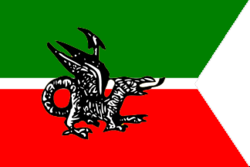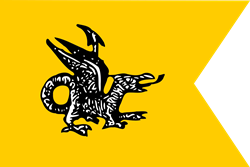Volga Bulgaria
On this page:
 The earliest known organized state within the boundaries of today’s Tatarstan was Volga Bulgaria (circa 700 AD – 1238 AD). This was a state where international trade was important, and the Volga Bulgars were a part of a trading network that spread over both the Baltic, Inner Eurasia, and the Middle East.
The earliest known organized state within the boundaries of today’s Tatarstan was Volga Bulgaria (circa 700 AD – 1238 AD). This was a state where international trade was important, and the Volga Bulgars were a part of a trading network that spread over both the Baltic, Inner Eurasia, and the Middle East.
Islam was first introduced to Volga Bulgaria by missionaries from Baghdad in the 920s.
The Volga Bulgaria epoch ended in 1238 when the state fell after being attacked by armies controlled by the Mongol prince Batu Khan.
Volga Tatars
Eventually, population known as the Volga Tatars emerged in what used to be Volga Bulgaria. Some researchers argue that this was the result of the descendants of the Volga Bulgarians intermarrying with the Kipchak-speaking people of the Golden Horde. Other researchers argue that no such mixing took place and that the Volga Bulgarians simply adopted the Kipchak-based Tatar language.
Khanate of Kazan
 Soon after being invaded by warriors of the Timur Empire in the late 14th century, the Golden Horde broke into smaller smaller Tatar khanates which then declined steadily in power over the years. This led to less centralization and more local independence, and in 1438, the region once known as Volga Bulgaria became an independent Tatar Turkic state called the Khanate of Kazan. The khans that ruled the Khanate of Kazan until 1552 where patrilineal descendants of Tugh Temür, one of Genghis Khan’s grandsons.
Soon after being invaded by warriors of the Timur Empire in the late 14th century, the Golden Horde broke into smaller smaller Tatar khanates which then declined steadily in power over the years. This led to less centralization and more local independence, and in 1438, the region once known as Volga Bulgaria became an independent Tatar Turkic state called the Khanate of Kazan. The khans that ruled the Khanate of Kazan until 1552 where patrilineal descendants of Tugh Temür, one of Genghis Khan’s grandsons.
The capital of the khanat was Kazan, a city located roughly 170 km up the Volga from the old (and now ruined) capital of the Volga Bulgarians.
Tsardom of Russia
In 1552, the Khanate of Kazan came to an end as it was conqured by Ivan the Terrible’s army and incorporated into the Tsardom of Russia. An epoch of forced Russifiation started, which included forcing a large number of residents to convert to Christianity. By 1593, all mosques in the former khanate had been destroyed. The ban on building mosques was not lifted until the 1700s when Catherine the Great changed the law.
In the 1800s, the region became a centre for the Jadids, a Muslim modernist reform group within the Russian Empire. According to the Jadids, the Muslims within the empire had entered into a period of decay and the best way out of it would be through acquisition of new knowledge. They advocated for a modernist, European-modeled cultural reform. A leading figure among the Jadids was the Crimean Tatar Ismail Gasprinski.
Revolution and civil war

The October revolution of 1917 was followed by the Russian Civil War of 1918-1920. One aspect of this complex war was the efforts of Tatar nationalists who wished to established an independent republic: the Idel-Ural State.
The Tatar nationalists were defeated by the Bolsheviks, who instead established the Tatar Autonomous Soviet Socialist Republic on May 27, 1920, and named Kazar as its capital. The boundaries of the Tatar ASSR did not include a majority of the Volga Tatars.
Within the Soviet uinion, including Tatar ASSR, the Bolsheviks largely outlawed religion, and the theologians were prosecuted.
The Tatar Autonomous Soviet Socialist Republic (Tatar ASSR)
1921–1922 famine
An estaimted 2 million people in Tatar ASSR and Volga-Ural died becaue of the 1921-1922 famine in the region. (There were famines outside the Tatar ASSR as well, and roughly half of the whole Volga Tatar population in the USSR died in famines in 1921-1922.) After the famine, the Soviet government settled ethnic Russians in both Tatar ASSR and the Volga-Ural region, which ment that the Tatars were no longer a majority here.
The proportions of Tatars, Russians and Chuvash in Tatar ASSR and the subsequent Tatarstan has been roughly the same after this. A census from 1926 show 48.7% Tatars, 43.1% Russians and 4.9% Chuvash. At the 2010 census, slightly more than 52% of the population was Tatar, almost 40% were Russians and circa 3% were Cuvach. There was also a 4% category made up by those that were neither Tatar, ethnic Russian or Cuvach.
The 1921-1922 famine in the Tatar ASSR was the result of war communist policy, and the event was a part of the greater Russian famine of 1921-1922 that affected other parts of the newly formed USSR. According to history professor Roman Serbyn, the ASSR Tatar famine and the way it was handled was an instrument for the Soviet authorities to systematically target the Volga Tatars.
Regretably, this was not un isolated incident. The Tatar ASSR famine was just one of a number of man-made famines deliberately used by the Soviet government to target specific ethnic groups and quench rebellious forces within the empire.
The Tatar Union of the Godless
The Tatar Union of the Godless was an organisation active within historically muslim dominated parts of the Soviet Union, including the Tatar USSR. In 1928, the organisation fell victim to one of Joseph Stalin’s purges. The leaders of the union were arrested and had their Bolshevik Party membership withdrawn, and some of them were sentenced to death.
Tatarstan – a republic within the Russian Federation
 On August 30, 1990, the Tatar ASSR proclaimed “The Declaration on the State Sovereignty of the Tatar Soviet Socialist Republic”.
On August 30, 1990, the Tatar ASSR proclaimed “The Declaration on the State Sovereignty of the Tatar Soviet Socialist Republic”.
In 1992, a referendum was held in Tatar ASSR where 62% of those who voted did so in favor of the suggested new constitution, a consitution where Tatarstan was defined as a Sovereign State. The Russian Consitutional Court unsurprisingly declared both the referendum and the consitution unconstitutional.
In 1994, a power-sharing treaty was signed by the governments of Tatarstan and the Russian Federation, and the consitution that was introduced in 2002 define Tatarstan as a republic within the Russian Federation. The power-sharing treaty was redefined in 2007, with more power going to the government of the Russian Federation and less to the local Tatarstan government.
An attempt to declare Tatarstan independent from the Russian Federation was made by the Milli Mejlis of the Tatar People, but it was largely ignored by the Russian government and most of the international community, including the United Nations.
In 2018, the power-sharing treaty signed in 1994 and redefined in 2007 expired, making Tatarstan lose its previously special status within the Russian Federation.